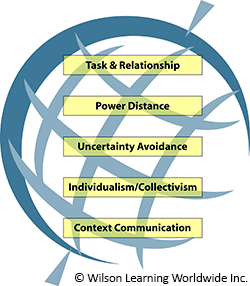Global Effectiveness
Businesses big and small are participating in the global marketplace. In fact, an employee need not travel across the ocean to experience different cultures and ways of life; cultural differences are present within national boundaries. In order for business deals to run smoothly, it is becoming more important for every member of an organization to be able to interact effectively with people from other cultures. Many business opportunities are lost due to cultural misunderstandings. By equipping each employee with the appropriate knowledge, those deal-breaking, costly mistakes can be avoided.
Global Effectiveness is based on working within the five cultural dimensions. This program will teach participants what types of behaviors to expect from certain cultures and how to prepare themselves for business interactions. Also, as participants learn about each of the five dimensions, they will understand stereotypes differently and will be able to make business interactions run more smoothly.
Program Outcomes
By implementing Global Effectiveness, each participant will become more interculturally savvy and thus more effective at conducting business across cultures. While many business deals dissolve from lack of understanding across cultures, this program gives participants a greater depth of knowledge to prevent such misunderstanding and complete business efficiently and effectively. Global Effectiveness turns cultural differences from an unknown liability into an asset.
Approach
Wilson Learning believes that learning must be transferred to day-to-day work practices. To achieve this, Global Effectiveness includes components and activities that enhance:
Participant Readiness: Prepares participants and managers for the overall learning experience
- Pre-workshop communication sets the context for learning.
Learning Transfer: Embeds practice and use of new skills in the learning design. The learning can be flexibly delivered as a:
- Two-day face-to-face application-oriented workshop
- Modular workshop, delivered over non-consecutive days to allow application between sessions
The face-to-face workshop can be taught by a Wilson Learning facilitator or by an organization's own leader-trained in-house professional.
Organizational Alignment: Ensures the organization supports the use of the new skills
- Post-learning reinforcement activities (optional) for both the manager and participant support skill application and implementation.
As a result, participants will continue to apply the skills and tools learned in Global Effectiveness long after the learning event is completed.
For a deeper background on social interactions, it may be beneficial for participants to attend the Building Relationship Versatility course prior to attending Global Effectiveness
Enabling Improved Performance
Global Effectiveness can be enhanced with optional performance application, reinforcement, and support tools. These ensure that participants can hone newly acquired skills and behaviors upon returning to work. Involving managers early on and training them to coach to global effectiveness is also important for successful Global Effectiveness implementation.
To discover how we ensure learning is reinforced and applied for improved performance, see our Learning Transfer Approach.
Evaluation
Organizations that implement Global Effectiveness have access to a broad range of tools to measure initial behavioral changes and business results. One approach may be a web-based survey of participants to identify the degree of change in key skills and document the differences this change makes. Other research options are also available.
To learn more about measuring the impact of learning, visit Measurement and Evaluation Services.
This offering, like all others from Wilson Learning, can be customized to reflect your environment and business priorities and can be integrated with your processes.



 Please complete this form to download the factsheet for Global Effectiveness.
Please complete this form to download the factsheet for Global Effectiveness.



